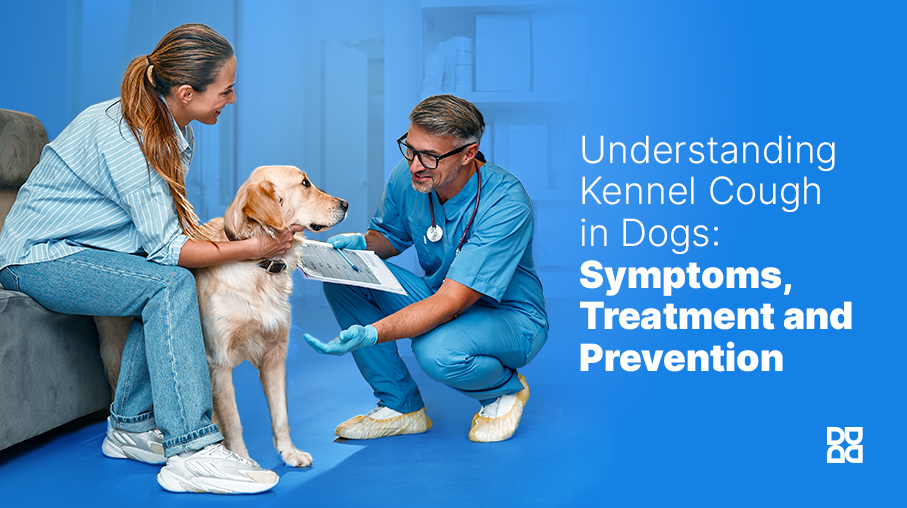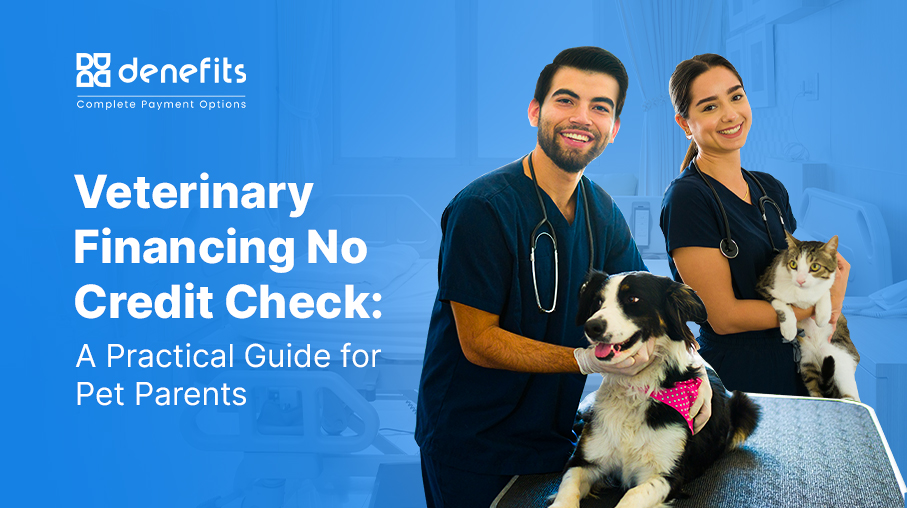
Annually, about 5.5 million kennel cough cases are seen by the U.S. veterinarians.
If you've recently noticed your dog coughing after drinking water, Kennel Cough might be the culprit. Whether you're a pet parent to a Chihuahua or a Doberman, this condition affects dogs of all breeds and ages. Fortunately, in many cases, it'll resolve on its own or with a few antibiotics for kennel cough. However, puppies, senior dogs, and those with weakened immune systems might require more than just cough suppressants for dogs.
Are You Looking for DAPP Vaccine for Dogs? and How Often Do Dogs Need Rabies Shots?
Dive into Our Comprehensive Guide About Puppy Vaccination to Keep Him Healthy
So, how do you ensure your dog is in the clear? In this blog, we'll first discuss Kennel Cough symptoms and Kennel Cough treatment options. Further, we'll deliberate whether it's best to treat pets using home remedies for kennel cough or take them to the vet. Lastly, we'll explore the best way to afford Kennel Cough Treatment. We know you want your pets to be safe, and so do we, read on!
What Is Kennel Cough?
Kennel Cough, also known as Canine Infectious Respiratory Disease (CIRD), is a highly contagious respiratory ailment in dogs. Caused by various viruses and bacteria, symptoms vary depending on the specific pathogens involved. Dogs of all ages can be affected. Moreover, Kennel Cough can be observed in individual cases and outbreaks.
Dogs confined in places like shelters, kennels, and dog shows are more prone to contracting Kennel Cough. Most dogs typically experience mild to moderate symptoms. However, puppies, immunosuppressed dogs, or those with underlying diseases, may cause severe complications. These could include bronchopneumonia, which can further lead to difficulty breathing, weight loss, fever, and even death
What are the Most Prominent Kennel Cough Symptoms?
Kennel cough symptoms in dogs may vary depending on the severity. However, the most common visible symptoms are as follow:
- Persistent dry cough (even at night)
- Retching or gagging
- Tracheal sensitivity
- Nasal discharge
- Sneezing
- Lethargy
- Mild fever
- Loss of appetite
- Troubled breathing
What are the Main Causes of Kennel Cough in Dogs?
There are usually a multitude of reasons involved in the case of a kennel cough. Infections are caused by organisms that frequently occur concurrently to create a case of kennel cough.
The most common ones are as follow:
- Bordetella bronchiseptica
- Parainfluenza virus
- Adenovirus type 2
- Canine distemper virus
- Canine influenza virus
- Canine herpesvirus (young puppies)
- Mycoplasma canis
- Canine reovirus
- Canine respiratory coronavirus
A vet diagnosis is the best way to identify these. They may be able to answer questions like "What is bordetella in dogs?" or “Can I treat small dog kennel cough at home?” better than Google. And without causing panic.
Additionally, environmental factors and underlying health conditions may also be reasons behind Kennel Cough in dogs.
- Overcrowded spaces
- Poor ventilation
- Chronic heart or lung disease
- Compromised immune system
- Heavy dust exposure
- Cigarette smoke exposure
- Cold temperature
Where is the higher risk for your dog to contract Kennel Cough?
Kennel Cough is highly contagious, consequently, a healthy dog can contract it through close contact with an infected dog. Additionally, it can also happen through infected objects. This can be through toys, food bowls, or water bowls. Moreover, dogs are exposed to kennel cough in crowded areas with poor ventilation. Dogs are more vulnerable in certain settings, such as:
- Dog parks
- Dog shows
- Vet clinics
- Dog grooming salons
- Dog daycare
- Dog boardings
- Multi-dog households
- Training centers
- Daily walks
- Pet stores
- Shelters
- Public or commercial transport
How Do Vets Diagnose Kennel Cough?
If you notice persistent symptoms of Kennel Cough in your dog, it's best to take it to the vet. Veterinarians thoroughly examine your little one to categorize the case of Kennel's cough as mild, progressive, or severe. This helps treat it effectively. Firstly, they rely on visible signs of Kennel Cough, such as hacking or gagging cough. Further, if they think it necessary, they may conduct laboratory tests to ensure an accurate diagnosis. The entire process may entail:
- A Clinical Examination: As the first resort, vets analyze your pet's symptoms and medical history.
- Tracheal Cytology: A swab of the trachea is examined to further understand the symptoms of infection.
- Blood Tests: These help detect elevated white blood cell counts, indicating infection or even chances of pneumonia.
- X-rays or Bronchoscopy: To rule out pneumonia, collapsing trachea, or other respiratory conditions, vets may carry out X-rays.
What is the Best Kennel Cough Treatment?
Well, that depends. If it is an uncomplicated case of kennel cough, it will most likely go away by itself. Supportive care, focusing on rest, nutrition, hydration, and home remedies for kennel cough are suggested. Medication-wise, cough suppressants for dogs should suffice. Ideally, the dog should recover after a week or so.
However, progressive or severe cases of kennel cough may need expert medical attention from a vet. These cases often involve a progression from minor bronchitis to more severe pneumonia. And the treatment can entail the use of antibiotics for kennel cough prescribed by the vet to curtail pneumonia. Additionally, hospitalization may be required.
That being said, it is crucial to distinguish between a mild or progressive case of kennel cough and a severe one. The categorization by symptoms is as follows, although they may vary due to other factors such as underlying health issues:
- Mild: Coughing, sneezing, nasal discharge, and fever.
- Progressive: Mild signs that persist or worsen over time.
- Severe: Pneumonia and bacterial infection.
Kennel Cough Treatment by Vets
To Visit or Not to Visit the Vet for Kennel Cough in Dogs
Make an appointment with the vet in case:
- Your pet's cough worsens or lasts longer than a week
- They are in a state of constant lethargy or tiredness
- Fever is making them feel restless
- Your dog isn't eating properly or at all
- They have underlying health issues
What to Expect from a Vet Visit?
Again, it depends on the severity of the kennel cough. In mild cases, a vet may prescribe cough suppressants for dogs at the most. Additionally, they may give a few care tips for speedy recovery.
However, in more complex cases, where the dog may develop pneumonia, the vet may suggest hospitalization. Additionally, antibiotics for kennel cough, intravenous fluids, and even oxygen therapy may be required.
Home Remedies for Kennel Cough
Cases of mild kennel cough can be treated at home. There are a few measures you've to take, such as:
- Make sure your dog gets ample rest.
- Ensure your dog has enough water to prevent dehydration.
- Use a humidifier to help your dog breathe better.
- Prepare nutrition-rich meals for your dog to aid their recovery.
- Keep your dog isolated from other pets to prevent spread.
How to Promote Smooth Recovery from Kennel Cough in Dogs
Recovering from kennel cough can be hard for your pet. And we know you want to do everything in your power to help them. Some measures you can take to promote their smooth recovery include:
- Stick by the treatment rulebook of the vet.
- Isolate your dog from other dogs during recovery.
- Prevent reinfection by maintaining good hygiene.
- Keep an eye on your dog for any changes in symptoms
Is Kennel Cough Fatal to Dogs?
More often than not, kennel cough is not fatal to dogs. Especially when diagnosed and treated promptly. However, severe cases or complex cases of kennel cough can be life-threatening. It's best to see a vet to ensure an immediate diagnosis and treatment. Particularly when it comes to puppies, senior dogs, and dogs with underlying health issues or weakened immune systems.
Is Your Dog at Risk?
As much as we hate to say it, it's highly likely that your dog is at risk. In fact, all dogs are. Kennel Cough is contagious and can be transmitted when dogs cough, come in contact with each other, or with contaminated surfaces.
Even briefly. Puppies, senior dogs, and dogs with a history of illnesses are at an even greater risk. Especially those who have not been vaccinated. Although vaccinated dogs may also contract Kennel Cough, not every strain can be covered by a vaccine.
How Can Kennel Cough be Prevented?
Although there's no one way to prevent Kennel Cough, certain measures can be taken to reduce your dog's chances of contracting it.
- Ensure your dog is regularly vaccinated against major Kennel Cough agents.
- Make sure your home is properly ventilated.
- Minimize stressors in your dog's life.
- Limit your dog's exposure to unclean and overcrowded spaces.
Is Kennel Cough Treatment Affordable?
Typically, the cost of kennel cough treatment ranges from $75 to $200, depending on the dog's size. Additionally, the cost varies based on the diagnosis or medications prescribed. If it's a severe case, lab work and X-rays may also be needed, adding an additional $200 to $500.
Finally, the cost may also vary by the time it takes your dog to recover from Kennel Cough as frequent vet visits may be required. The affordability of the treatment depends on your financial resources and the above-mentioned factors.
What is the Best Way to Pay for Kennel Cough Treatment?
We know that when it comes to your dog, you can't compromise. And you shouldn't. However, that doesn't mean you should spend your rainy-day money or exhaust your monthly budget over it. There are better ways to pay for your dog's Kennel Cough treatment. One of the best ways is in manageable monthly installments. Yes, many vets now offer dog parents flexible payment options. They do so through a payment plan software like Denefits.
It is one of the most convenient ways to afford your dog's kennel cough treatment without making a hefty upfront payment. Moreover, this flexible payment option has a NO CREDIT CHECK policy and a 95% approval rate, so you don't have to worry about rejections. That being said, should your pet contract Kennel Cough, find a vet near you that offers Denefits' payment plans.
Conclusion
Kennel cough is a common yet manageable ailment in dogs. If you promptly diagnose kennel cough symptoms and treat it, chances are your dog will recover in days. However, don't hesitate to consult your veterinarian for guidance and treatment. Additionally, to ensure the treatment doesn't take a toll on your savings, find a vet that offers flexible payment plans through Denefits.


